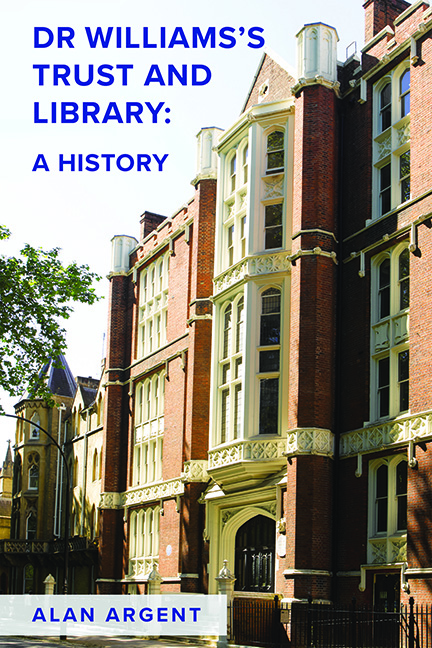Book contents
- Frontmatter
- Dedication
- Contents
- List of Illustrations
- Foreword
- Preface
- Abbreviations
- Notes on Dates, Money, Welsh Place Names and Publications
- Prologue
- 1 Dr Williams and His Will
- 2 Benjamin Sheppard, Receiver 1721–31: Faith, Fitness, and Diligence
- 3 Constructing the Library Building 1725–30: A Proper Plan
- 4 Francis Barkstead, Receiver 1731–47: Piety and Charity
- 5 John Cooper, Receiver 1748–62: Liberty and Liberal Dissent
- 6 Richard Jupp junior, Receiver 1762–95: A Very Respectable Body
- 7 Richard Webb Jupp, Receiver 1795–1850, and David Davison, Receiver 1850–7: Fashionable Sympathies Amid Increasing Light
- 8 Walter D. Jeremy, Receiver 1857–93: The Scrupulous Observer
- 9 Francis H. Jones, Secretary and Librarian 1886–1914: Introducing Order
- 10 Robert Travers Herford, Secretary and Librarian 1914–25: Application and Imagination
- 11 Stephen Kay Jones, Librarian 1925–46, and Joseph Worthington, Secretary 1925–44: A New Age with Old Strains
- 12 Roger Thomas, Secretary 1944–66 and Librarian 1946–66: Trusted Innovator
- 13 Kenneth Twinn, Secretary and Librarian 1966–76: Modest Dependability
- 14 John Creasey, Librarian, and James McClelland, Secretary, 1977–98: Mixed Blessings
- 15 David Wykes, Director 1998–2021: Past, Present, and Future
- 16 Dr Williams’s Trust: An Assessment
- Appendix 1 Trustees in 1723
- Appendix 2 Lists from Short Account (with later additions)
- Bibliography
- Index
4 - Francis Barkstead, Receiver 1731–47: Piety and Charity
Published online by Cambridge University Press: 26 May 2022
- Frontmatter
- Dedication
- Contents
- List of Illustrations
- Foreword
- Preface
- Abbreviations
- Notes on Dates, Money, Welsh Place Names and Publications
- Prologue
- 1 Dr Williams and His Will
- 2 Benjamin Sheppard, Receiver 1721–31: Faith, Fitness, and Diligence
- 3 Constructing the Library Building 1725–30: A Proper Plan
- 4 Francis Barkstead, Receiver 1731–47: Piety and Charity
- 5 John Cooper, Receiver 1748–62: Liberty and Liberal Dissent
- 6 Richard Jupp junior, Receiver 1762–95: A Very Respectable Body
- 7 Richard Webb Jupp, Receiver 1795–1850, and David Davison, Receiver 1850–7: Fashionable Sympathies Amid Increasing Light
- 8 Walter D. Jeremy, Receiver 1857–93: The Scrupulous Observer
- 9 Francis H. Jones, Secretary and Librarian 1886–1914: Introducing Order
- 10 Robert Travers Herford, Secretary and Librarian 1914–25: Application and Imagination
- 11 Stephen Kay Jones, Librarian 1925–46, and Joseph Worthington, Secretary 1925–44: A New Age with Old Strains
- 12 Roger Thomas, Secretary 1944–66 and Librarian 1946–66: Trusted Innovator
- 13 Kenneth Twinn, Secretary and Librarian 1966–76: Modest Dependability
- 14 John Creasey, Librarian, and James McClelland, Secretary, 1977–98: Mixed Blessings
- 15 David Wykes, Director 1998–2021: Past, Present, and Future
- 16 Dr Williams’s Trust: An Assessment
- Appendix 1 Trustees in 1723
- Appendix 2 Lists from Short Account (with later additions)
- Bibliography
- Index
Summary
Another member of Williams's family circle, Francis Barkstead, continued Sheppard's work as receiver, establishing and strengthening the charities in accordance with Dr Williams's will. The trustees also maintained their loyal and active support. DWT's Welsh schools and schoolmasters often met opposition from local dignitaries, hostile to nonconformity. Outside the terms of the will, a register of births for nonconformists was desired.
Barkstead as Receiver – His Early Years in Office
Benjamin Sheppard's death in 1731 led to Francis Barkstead, his brother-in-law, taking on the duties of ‘Receiver & Acomptant’. This allowed continuity as the flow of financial generosity continued; at the meeting when Sheppard's death was announced, three trustees gave £20 each and five trustees two guineas each towards the debts. A year later Obadiah Hughes forwarded £15, from ‘a private Collection’ among trustees, to pay Bond's salary. One stall in the library, set aside for curious items, was labelled ‘the museum’. John Welch presented £50, from an ‘Anonimous Gentleman’, which bought ‘a Handsome Case’ for the ‘Skeleton’ (donated early in DWL's existence), two grates for the attic, and kitchen furniture, and in January 1733 John Hollis gave dozens of knives and forks (his family were cutlers). Later that year several trustees contributed thirteen guineas. In February 1735, the trustee Antonio Walburgh (Anthony Walbarge d.1749), a correspondent member of the SSPCK, gave £100 for purchasing books, and in 1738 Alleyn Smith of Battersea left a similar sum.
On John Evans's death in May 1730, his plan to write a history of the puritans to 1640 (with Daniel Neal continuing the account after 1640) remained unfulfilled. Evans's books were sold by auction in December 1730, with several (Marprelate tracts, John Penry's works, and one tract by Robert Browne) going to DWL. Subsequently Neal (1678–1743) took on the whole project and in 1732 he presented DWL with copies of his History of New England (London, 1720) and volume 1 of his History of the Puritans (London, 1732). Meanwhile the trustees judged certain works as unfit, among them those of Augustine of Hippo. Less surprisingly, in 1737 Thomas Rowe's donation of Samuel Butler's anti-puritan polemic Hudibras was discarded, although Rowe gave other valuable books to DWL.
- Type
- Chapter
- Information
- Dr Williams's Trust and Library , pp. 55 - 82Publisher: Boydell & BrewerPrint publication year: 2022



